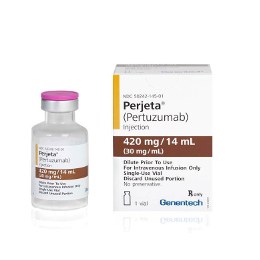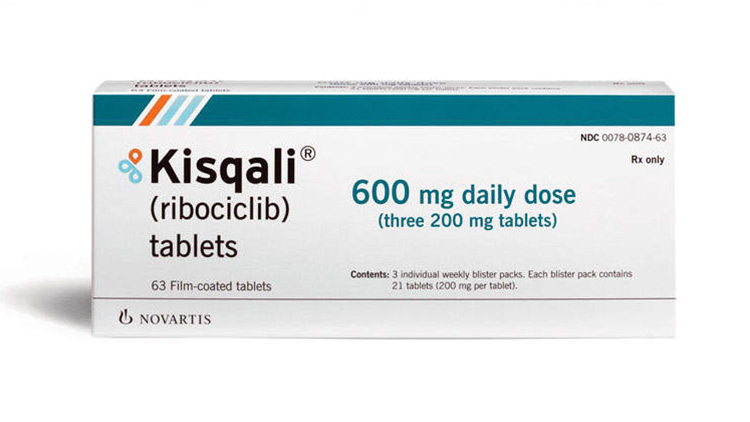Perjeta (Pertuzumab) vs Kisqali (ribociclib)
Perjeta (Pertuzumab) vs Kisqali (ribociclib)
Perjeta (pertuzumab) is a monoclonal antibody designed to target HER2-positive breast cancer, working by blocking the HER2 receptor and is typically used in combination with other drugs like trastuzumab and chemotherapy. Kisqali (ribociclib), on the other hand, is a CDK4/6 inhibitor that is used to treat HR-positive, HER2-negative advanced or metastatic breast cancer, functioning by interfering with the cell cycle and preventing cancer cell proliferation. The choice between Perjeta and Kisqali would largely depend on the specific breast cancer subtype a patient has, as well as other individual factors such as previous treatments, overall health, and the presence of hormone receptors or HER2 protein on the cancer cells.
Difference between Perjeta and Kisqali
| Metric | Perjeta (Pertuzumab) | Kisqali (ribociclib) |
|---|---|---|
| Generic name | Pertuzumab | Ribociclib |
| Indications | HER2-positive breast cancer | HR-positive, HER2-negative breast cancer |
| Mechanism of action | HER2/neu receptor antagonist | CDK4/6 inhibitor |
| Brand names | Perjeta | Kisqali |
| Administrative route | Intravenous | Oral |
| Side effects | Diarrhea, rash, nausea, fatigue, infusion reactions | Neutropenia, nausea, infections, fatigue, diarrhea |
| Contraindications | Hypersensitivity to pertuzumab or its excipients | Hypersensitivity to ribociclib or its excipients, QT prolongation |
| Drug class | Monoclonal antibody | Protein kinase inhibitor |
| Manufacturer | Genentech (Roche) | Novartis |
Efficacy
Efficacy of Perjeta (Pertuzumab) in Breast Cancer
Perjeta (pertuzumab) is a monoclonal antibody designed to target the HER2 receptor, which is overexpressed in a subset of breast cancers. Clinical trials have demonstrated that when pertuzumab is combined with trastuzumab and chemotherapy, it can significantly improve progression-free survival (PFS) and overall survival (OS) in patients with HER2-positive metastatic breast cancer. The CLEOPATRA study, a pivotal phase III trial, showed that this combination therapy extended the median PFS by 6.3 months and improved the median OS by 15.7 months compared to trastuzumab and chemotherapy alone. Pertuzumab is also approved for use in the neoadjuvant (pre-surgery) setting, where it has been shown to increase the rate of pathological complete response (pCR), which is associated with better long-term outcomes in breast cancer.
Efficacy of Kisqali (Ribociclib) in Breast Cancer
Kisqali (ribociclib) is an oral inhibitor of cyclin-dependent kinases 4 and 6 (CDK4/6), which are involved in the proliferation of cancer cells. Ribociclib, in combination with an aromatase inhibitor or fulvestrant, is indicated for the treatment of hormone receptor-positive, HER2-negative advanced or metastatic breast cancer. The MONALEESA clinical trials have demonstrated that ribociclib significantly improves PFS in this patient population. For instance, the MONALEESA-2 trial reported a median PFS of over 25 months with ribociclib plus letrozole, compared to 16 months with letrozole alone. Additionally, the MONALEESA-7 trial showed that premenopausal women with advanced breast cancer experienced a substantial PFS benefit when ribociclib was added to standard endocrine therapy.
Both Perjeta and Kisqali represent significant advancements in the treatment of breast cancer, targeting different mechanisms involved in cancer cell growth and survival. Their efficacy has been established through rigorous clinical trials, and they continue to be important options in the management of specific breast cancer subtypes. The use of these targeted therapies is typically based on the molecular characteristics of the tumor, and they have become part of the standard of care for patients with the appropriate breast cancer profiles.
It is important to note that while the efficacy of these drugs has been well established, the response to treatment can vary among individuals. Ongoing research continues to refine the use of Perjeta and Kisqali, including investigations into combinations with other therapies and the identification of biomarkers to predict response. As with all cancer treatments, the decision to use these medications should be made by a healthcare professional, taking into account the individual patient's health status, cancer characteristics, and treatment goals.
Regulatory Agency Approvals
Perjeta
-
European Medical Agency (EMA), European Union

-
Food and Drug Administration (FDA), USA

-
Health Canada

-
Therapeutic Goods Administration (TGA), Australia

-
Medsafe (NZ)

Kisqali
-
European Medical Agency (EMA), European Union

-
Food and Drug Administration (FDA), USA

-
Health Canada

-
Therapeutic Goods Administration (TGA), Australia

-
Medsafe (NZ)

Access Perjeta or Kisqali today
If Perjeta or Kisqali are not approved or available in your country (e.g. due to supply issues), you can access them via Everyone.org.
How it works

Make an enquiry
Choose the medicine you want to buy, answer a couple of questions, and upload your prescription to speed things up. We’ll get back to you within 24 hours.


Make an enquiry
Choose the medicine you want to buy, answer a couple of questions, and upload your prescription to speed things up. We’ll get back to you within 24 hours.


Breeze through the paperwork
We'll guide you through the required documents for importing unapproved medicine, ensuring you have all the necessary information.


Get a personalized quote
We’ll prepare a quote for you, including medicine costs and any shipping, administrative, or import fees that may apply.


Receive your medicine
Accept the quote and we’ll handle the rest - sourcing and safely delivering your medicine.

Some text on this page has been automatically generated. Speak to your physician before you start a new treatment or medication.
Let's talk
If you have any questions, call us or send us a message through WhatsApp or email:
Contact us




